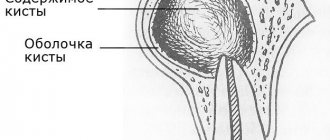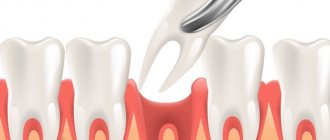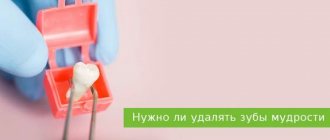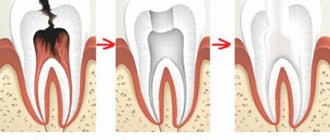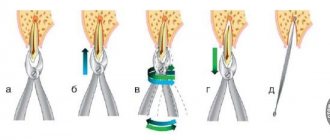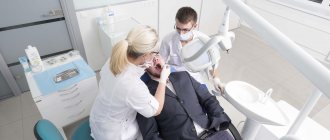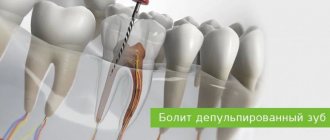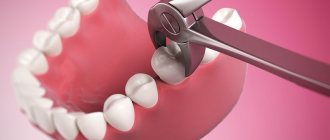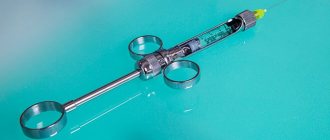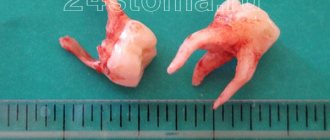At the Line of Smile dental clinic there is no clear policy not to operate on “these days.” But we always try to take into account the cyclical nature of women’s physiology, since surgery during menstruation can negatively affect further wound healing. Therefore, it is important for the client to be honest during the consultation with the doctor and not be embarrassed to ask to reschedule the planned operation. However, if an x-ray shows that there is an infectious focus, removal is carried out on an emergency basis, regardless of what day of the menstrual cycle we are talking about.
Why is it undesirable to have surgery during menstruation?
When planning an extraction, a highly qualified dentist always finds out what stage the woman is in her menstrual cycle. Why is he asking this? It's simple. The quality and composition of the blood directly determines the effectiveness of the anesthesia used and the rate of formation of a blood clot in the socket.
On menstrual days, blood clotting is significantly reduced. That's how it should be. Its composition also changes. Therefore, whenever possible, planned surgical intervention is postponed to “safer” days of the cycle.
Contraindications to the procedure
For some symptoms during the menstrual period, extraction is not done:
- severe abdominal pain, due to which you have to take painkillers;
- nausea;
- low blood pressure;
- heavy periods (heavy bleeding);
- dizziness.
If you feel unwell, surgical intervention will only worsen the problem. The likelihood of complications also increases, and pain after the anesthetic wears off can be excruciating.
Dental diagnoses in which periods are not a hindrance
If you doubt whether it is possible to remove a tooth during menstruation, contact your dentist. If the doctor deems it necessary, he will postpone the operation until later.
Indications for emergency intervention are:
- Severe inflammation, a purulent process that can provoke the development of an abscess, phlegmon, infection of the maxillary sinuses, osteomyelitis.
- A retracted (not fully erupted) wisdom tooth that is completely or partially hidden under the gum tissue/bone. It should be removed as soon as possible if a woman suffers from severe pain, swelling and swelling of the cheek.
- A tooth root fracture resulting from an injury.
- An advanced form of periodontal disease, when it is no longer possible to save the unit.
The specialists at the Line of Smile dental clinic never prescribe removal if it is possible to do without it. They always try to save the diseased tooth and prevent its further loosening and loss. If the roots are in good condition, a pin is installed in them, onto which the crown is fixed on top. Surgery is a last resort.
The need for a removal procedure
In some situations, delaying tooth extraction is not advisable and even dangerous. Severe inflammation increases the likelihood of developing sinusitis, otitis, osteomyelitis, sepsis and other dangerous diseases.
Indications for removal on critical days:
- acute pain that is poorly relieved by medication;
- severe swelling, swelling of the cheek;
- purulent inflammation: periodontitis, cyst and other pathologies;
- toothache accompanied by fever;
- acute pulpitis;
- tooth root fracture;
- impacted “figure eight”, which causes severe pain and swelling.
Menstruation does not become an obstacle if a woman is planning a business trip or vacation in the coming days. It is better to solve the problem in advance than to suffer from pain, postponing treatment until you return.
When to delay deletion
Any planned surgical intervention can be postponed for a couple of days until the menstrual bleeding stops.
So, you can wait if you need to delete:
- dystopic tooth located out of place;
- units that impede the implementation of prosthetics and the installation of orthodontic structures;
- wisdom teeth, which constantly injure the gums and mucous membranes of the oral cavity, cause chronic injuries and inflammation.
Chronic diseases often worsen on the eve of menstruation. This is due to a decrease in immune defense. If a woman knows that after menstruation she needs to go to the dentist and have a tooth removed, she should be especially careful about her health so as not to catch a cold. Otherwise, the procedure will have to be postponed indefinitely.
In what cases is it better to postpone extraction?
Tooth extraction is a last resort when therapeutic treatment is impossible or does not bring a positive effect. If there is no serious inflammation, then the date of the planned operation can be postponed by several days.
Removal can be delayed for the following indications:
- extensive caries without an inflammatory process;
- dystopic teeth;
- extraction of dental units for further prosthetics.
If the operation has been postponed, then during menstruation you need to protect yourself from colds. Since immunity decreases during this period, you can easily get sick with acute respiratory infections. In case of acute respiratory diseases, removal is not performed, which means you will have to wait for an indefinite period of time.
Use of anesthetics
All surgical procedures are performed by Smile Line doctors using highly effective modern anesthetics. This guarantees the absence of pain during tooth extraction and makes the procedure as comfortable as possible.
Usually, when working with the first to fifth teeth, infiltration anesthesia is used. The dentist gives an injection, after which a separate area of the oral cavity “goes numb” and becomes insensitive. If it is necessary to pull out the sixth, seventh or eighth molar, the roots of which are very large and deep, they resort to conduction anesthesia.
Recommendations after removal
Regardless of which tooth you removed or just its root, you must follow the rules of the rehabilitation period. Then healing takes place quickly and without complications.
- Do not eat for 2-3 hours after surgery.
- Eliminate hot and solid foods from your diet for 7 days.
- Carefully walk around the socket when brushing your teeth.
- Do not pick out the blood clot and try not to disturb the hole with your tongue until it is completely healed.
- Don't rinse your mouth.
The Vimontal Clinic carries out operations of any complexity using advanced equipment. This allows you to provide assistance with maximum comfort and safety.
Precautions after treatment
If the procedure is performed on menstruation, the dental surgeon tells the patient about possible complications and gives detailed instructions on how to behave to avoid them. To minimize the risk of bleeding, you should stop smoking a few days before surgery. This will have a positive effect on blood clotting. Also the day before, you need to exclude coffee-containing drinks from your diet, reduce the intensity of sports training, and avoid hypothermia and overheating of the body.
Immediately after removal, you need to spend about an hour in the clinic so that the doctor can make sure that a dense clot has formed in the hole. It is not recommended to go to work on the day of the procedure. The best option is to go home and rest.
It is extremely important to follow all medical instructions and take prescribed medications. If your body temperature rises, the wound begins to bleed, your health deteriorates sharply, dizziness and nausea appear, you should immediately seek medical help.
There is no need to rinse unless prescribed by your dentist. You should also not touch the hole with your tongue. This can lead to the clot breaking off and opening the wound, causing re-bleeding. In addition, an uncovered hole is a gateway for infection.
Only a doctor can clearly answer the question of whether it is possible to remove a tooth during menstruation. In our dentistry, experienced surgeons perform tooth extraction. We do everything possible to ensure that our patients become healthy as quickly as possible.
Why is it better not to treat teeth on critical days?
There are three reasons to postpone visiting the dentist until the end of your menstrual cycle.
1 reason. Blood clotting disorder. On critical days, a woman’s blood vessels dilate. If a tooth is removed during this period, it can lead to heavy bleeding, which only a doctor can stop.
Reason 2. Reduced pain threshold. Before menstruation, the female body produces prostaglandins. These are the hormones that start the process of menstruation. Thanks to them, the uterus contracts, its inner lining peels off and blood is released. Because of these hormones, a woman experiences pain and experiences any unpleasant sensations more intensely.
Reason 3. Risk of inflammation. During menstruation, blood clots more slowly than usual. Therefore, the holes in the oral cavity take several times longer to heal. The immune system is weakened and the body is vulnerable to infections. If a bacteria or virus enters an open wound, gum inflammation will begin.
Note. If on critical days a woman does not experience pain, discomfort and other unpleasant sensations, then dental procedures may not be tolerated. But you need to warn your dentist in any case.
Table of contents
- At what age are eights cut?
- Why is the wisdom tooth called that way?
- How long does it take for a number eight to grow?
- What is a wisdom tooth for?
- When are eights removed?
- Tooth extraction problems
- Is there pain when removing figure eights?
- What measures to take if you have dental problems during pregnancy?
- Complications during the eruption of wisdom teeth
- Actions prohibited for wisdom tooth pain
- What to do if the gums around a wisdom tooth are inflamed
- Is it possible to treat eights with folk remedies?
The eights in human teeth are located at the edges and this is what makes them too problematic. It is worth noting that, unlike other teeth, these grow only many years after the others have appeared, and in some cases the immediate process of their growth causes severe pain and requires their immediate removal. Statistics show the fact that not every person can always have a wisdom tooth, since during the development of the human race significant transformations took place and the jaw of modern people is 12 mm smaller relative to their ancestors, which is caused by eating softer and thermally processed food, which reduces the load on the jaw . Everyone has the germ of a wisdom tooth, but whether they grow or not depends only on physiology.
At what age are eights cut?
The replacement of a row of milk teeth with molars is carried out from 6-12 years. The eruption of wisdom teeth may not begin until the age of 21, but if they have not shown any signs of their existence before the age of 27, then it is quite possible that they will not grow at all. In medical practice, there are cases where a wisdom tooth can erupt at the age of 40, but such cases are very rare.
Why was the wisdom tooth called that way?
As already mentioned, teeth erupt before the age of 7 years, and wisdom teeth in the period 18-27 years. It is at this age that the formation of organs ends and the aging of the body actually begins. In other words, wisdom teeth begin to erupt at a time when the body has reached its maturity, which is how they get their name.
How long does it take for a number eight to grow?
How long the figure eight will grow depends on several factors. Initially, it depends on the size of the jaw a person has, as well as whether there is free space for the tooth to be normally located in its rightful place. If the jaw is too small, and there is simply no additional space for wisdom teeth to grow, then they will begin to gradually move neighboring teeth, which can last for several years, and will also cause a distortion in the evenness of the teeth.
What is a wisdom tooth needed for?
Nature has thought out each organism so carefully that each of its components, and in particular the wisdom tooth, cannot be superfluous. Some experts even call wisdom teeth rudiments, but they are often very useful in old age. It is on wisdom teeth that prosthetic bridges are placed in order to install a dental crown when other chewing teeth are removed. For this reason, dentists do not recommend immediately removing a wisdom tooth, since a banal 2-minute process can cost serious problems in the future.
When are eights removed?
Is it worth it or not to remove a wisdom tooth? This is the question that dentists are often asked by those who have encountered them. Wisdom tooth removal is the most standard surgical procedure, and to perform it, certain indicators are needed. Wisdom tooth removal is quite possible if:
- the presence of ratification of wisdom teeth, or in other words, incorrect placement of the figure eight, which can cause movement of other teeth during eruption;
- damage to wisdom teeth by caries, as this will affect the health of the root system and can affect neighboring teeth, but it is not always possible to fill the figure eight correctly and without mistakes;
- partial eruption of the wisdom tooth, which may occur due to the presence of an inflammatory process in the gum cavity;
- manifestation of pain in the trigeminal nerve;
- detection of a cyst in the cavity of the lower jaw;
- the presence of pain in the wisdom tooth, especially if it occurs when eating food;
- injury to the oral cavity if the wisdom tooth is positioned incorrectly.
Tooth extraction problems
The process of removing tooth 8 in a row can only be carried out by a qualified dental surgeon, after an x-ray. Almost always, tearing out a figure eight is painful, since its location will take a long time to heal and complications may develop. Pain, as a rule, after removal becomes the cause of the formation of alveolitis or, in other words, an inflammatory process in the socket.
Important: Ideally, the hole is covered with blood clots, which prevent the penetration of bacteria and food debris into it, therefore it is strictly forbidden to rinse the mouth after surgery. When washing out clots, you may encounter not just pain, but the formation of an infection, which will require additional surgical intervention and a long-term solution. At first, after the removal of a wisdom tooth, you may feel numbness in the cavity of the tongue, lips and even chin. If the numbness does not subside after a week, then a second visit to the doctor is required.
Is there pain when removing figure eights?
Naturally, tooth extraction is not the easiest or simplest process, and therefore many people are very worried about this and simply avoid meeting with a doctor. The operation is performed using local anesthesia. In other words, a strong painkiller is given, the type of which is discussed individually with the patient. Difficulties may arise when directly removing the figure eight, since the inconvenient location does not allow you to get close and quickly pull it out. Whether there will be severe pain after removal depends on:
- how the tooth is positioned;
- features of the root system;
- whether there are complications such as purulent inflammation, cyst or the like;
- human sensitivity threshold.
What measures should you take if you have dental problems during pregnancy?
Pregnancy is a very difficult and anxious period for every woman, but it is accompanied by a decrease in the level of calcium in the body, which primarily affects the teeth, their quality, strength and wear resistance. It is very important that no woman is immune from the fact that a wisdom tooth may start cutting or hurting.
Important: Gynecologists categorically prohibit dental treatment, regardless of their location, using anesthesia, as this has a detrimental effect on the development of the fetus. If there is a strong need, it is permissible to carry out removal or treatment only after reaching 22 weeks, since it is possible to use painkillers without harm to the baby.
Complications during the eruption of wisdom teeth
Unlike teething other teeth, eights can bring a lot of problems.
The tissue in the gum cavity near the tooth becomes inflamed. This most often manifests itself in the form of a tubercle covered with mucous membrane around the location of the figure eight. This is the so-called hood, which is injured with every meal, irritating the receptors in the mouth and thereby causing severe pain. This contributes to the formation of an inflammatory process and even the occurrence of infection with suppuration.
Sometimes it may seem that there is pain in the cheek, throat and tonsils, but it is the wisdom tooth that spreads these sensations. Only a specialist can identify and diagnose this problem, and therefore a doctor’s consultation is required to rule out the possibility of a cold.
Important: When the figure eight becomes inflamed, the whole body begins to suffer. In other words, the body temperature may rise, pain in the head, throat and even the cervical region may occur. The formation of swelling of the gums is allowed.
Actions prohibited for wisdom tooth pain
Experts do not recommend doing dental treatment on your own, or doing the following:
- warming the cheek, rinsing with hot water and applying a heating pad, as this can lead to a worsening of the condition and the occurrence of suppuration of the inflamed tissue;
- applying painkillers to the inflammation around the figure eight, which contributes to the appearance of ulcers on the tongue cavity, without relieving the pain;
- using advice from relatives, since you first need to find out the cause of pain and inflammation, and only then take measures to eliminate the problem.
What to do if the gums around the wisdom tooth are inflamed?
Intervention in the treatment of wisdom teeth on your own can cause a worsening of the condition, for example, fever, unbearable pain and similar problems. What to do if symptoms associated with the figure eight appear?
- Immediate contact with a dentist is required.
- An x-ray or, preferably, an ultrasound is required.
Important: When making a diagnosis such as the presence of suppuration, regardless of what stage of development, an immediate autopsy is required, as well as treatment and painkillers. Further development depends on the degree of complexity of the problem and on the medical indicators of the patient’s body.
Is it possible to treat eights with folk remedies?
To reduce pain during teething, you can use medications or folk remedies, but only with caution so as not to cause an allergic reaction and other serious consequences.
- The simplest method is considered to be the usual rinsing with a solution based on herbs such as sage, chamomile, oak bark or ordinary soda. It is permissible to lubricate the gums with sea buckthorn oil.
- Melissa officinalis, or to be more precise, a solution based on it is prepared immediately before use and should be stored in the refrigerator. 2 tbsp. pour 0.5 liters of boiling water, infuse for 4 hours and use for rinsing. The procedure is carried out 4 times every 24 hours, after which the composition is brewed again.
- You can boil chicory root and rinse your mouth with it. The peculiarity of the root is the presence of anti-inflammatory and analgesic effects. 250 ml of boiling water should be poured into a container with 1 tbsp. chicory root, previously thoroughly chopped. Boil the composition for 5 minutes. Next, you need to let it brew for 60 minutes, strain and rinse every 2 hours.
Important: If any problems arise with wisdom teeth, for example, pain, swelling, or even more so deformation of the teeth during eruption, you should immediately contact a dentist, a qualified specialist, for examination, consultation and taking certain measures to eliminate the problem.
Indications for removal:
- a painful tooth provokes the development of a cyst, negatively affects the function of the trigeminal nerve, causing its inflammation;
- abnormal position of the tooth, improper eruption, which affects the bite;
- constant injury by the edges of the crown of the mucous membrane, tongue due to the abnormal size of the tooth or its shape - this factor also affects the bite;
- multi-rooted teeth that provoke inflammation of the cyst - osteomyelitis;
- chronic inflammatory processes – periodontitis, impossibility of non-surgical treatment;
- advanced caries complicated by pulpitis, periodontitis, neuritis or odontogenic osteomyelitis.
After carrying out diagnostic measures, the doctor identifies the causative tooth and prescribes its removal. This happens in one session under local anesthesia.
When should they be removed?
There is no universal answer: in all cases the decision is made individually. Each option has its own arguments for and against, but in general the approach is as follows:
- It is undesirable to remove healthy teeth without compelling evidence.
- Preserving wisdom teeth may carry risks for the remaining teeth and for the course of treatment. Then the benefits of removal outweigh the possible negative consequences.
Should I delete the eights?
The decision is always made individually. Sometimes it happens that one orthodontist prescribes the removal of teeth (not necessarily eights, fangs are also recommended to be removed quite often), and another cancels this decision. There is nothing unusual in this, because each specialist has his own approach and his own vision of treatment planning. Therefore, anyone who doubts the correctness of treatment tactics is recommended to undergo additional consultation with another specialist or consider treatment with a different orthodontic system. This is normal practice as systems improve and more cases of irregularities are corrected without removing teeth.
Other articles:
10 problems of those with malocclusion
All types of orthodontic systems: from plates to aligners
How to eliminate cheek swelling
It is impossible to completely remove the tumor until the inflammatory process stops, but you can reduce it and minimize discomfort and pain. This can be done with ice and cold compresses. You need to apply a compress every half hour, but no longer than 10-15 minutes, otherwise it can cause hypothermia and tissue necrosis.
In addition, you can drink painkillers, analgesics, take baths and rinses with an antiseptic solution. Take antibiotics if prescribed by your doctor. This will eliminate the infection and speed up tissue healing.
In general, swelling of the cheek is a normal phenomenon if it occurs a couple of hours after tooth extraction and goes away no later than the seventh day after it. In all other cases, immediate specialist consultation, diagnosis and treatment are required.
What are wisdom teeth?
Dentists and scientists call them a vestigial organ, the need for which disappeared when people learned to heat food. Eights, like all other human teeth, consist of roots, a neck and a crown, but despite this they have certain anatomical features.
Here are the main differences:
- they are only indigenous and do not come in milk;
- their eruption is often accompanied by pain;
- have a larger number of roots - from 2 to 5;
- bent and twisted roots.
Diagnostics
Before removing a wisdom tooth, the surgeon needs to see a complete and accurate picture of its location. This is especially true in cases where the tooth has not erupted.
The specialist must prescribe an x-ray or orthopantomogram.
Before the operation:
- inspection;
- taking anamnesis;
- analysis of the received images.
The best dental clinic in Ivanteevka
Specialists at Sanident comprehensive dentistry in Ivanteevka offer a wide range of dental services: from caries treatment to prosthetics and restoration. We have innovative equipment, highly experienced staff, high-quality consumables, and at the same time quite affordable prices and promotions. We give a healthy and beautiful smile to everyone!
You can make an appointment with a dentist at our clinic by calling the phone number listed on the website or by visiting us in person at the following addresses:
- Ivanteevka, st. Novoselki, 4 (Ivanteevka railway station);
- Shchelkovo, st. Central, 80 (railway station Voronok).
